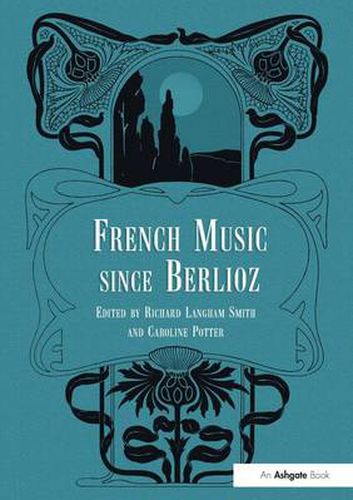Readings Newsletter
Become a Readings Member to make your shopping experience even easier.
Sign in or sign up for free!
You’re not far away from qualifying for FREE standard shipping within Australia
You’ve qualified for FREE standard shipping within Australia
The cart is loading…






This volume explores key developments in French classical music during the 19th and 20th centuries. It draws on the expertise of a range of French music scholars who provide their own perspectives on particular aspects of the subject. Deirdre Donnellon’s introduction discusses important issues and debates in French classical music of the period, highlights key figures and institutions, and provides a context for the chapters that follow. The first of these is by Timothy Jones who assesses the French contribution to those most Germanic of genres, 19th-century chamber music and symphonies. The very different genre of opera and spectacle is addressed by Thomas Cooper for the 19th century, and by Richard Langham Smith for the 20th. The quintessentially French tradition of the 19th-century salon is the subject of James Ross’s chapter, while the more sacred setting of Paris’ most musically significant churches and the contribution of their organists is the focus of Nigel Simeone’s essay. The transition from the 19th to the 20th century is explored by Roy Howat through a detailed look at four leading figures of this time: Faure, Chabrier, Debussy and Ravel. Robert Orledge follows with a later group of composers, Satie and Les Six, and examines the role of the media in promoting French music. The 1930s, and in particular the composers associated with Jeune France, are discussed by Deborah Mawer, while Caroline Potter investigates Parisian musical life during World War II. The book closes with two chapters that bring us to the present day. Peter O'Hagan surveys the enormous contribution to French music of Pierre Boulez, and Caroline Potter examines trends since 1945.
$9.00 standard shipping within Australia
FREE standard shipping within Australia for orders over $100.00
Express & International shipping calculated at checkout
This volume explores key developments in French classical music during the 19th and 20th centuries. It draws on the expertise of a range of French music scholars who provide their own perspectives on particular aspects of the subject. Deirdre Donnellon’s introduction discusses important issues and debates in French classical music of the period, highlights key figures and institutions, and provides a context for the chapters that follow. The first of these is by Timothy Jones who assesses the French contribution to those most Germanic of genres, 19th-century chamber music and symphonies. The very different genre of opera and spectacle is addressed by Thomas Cooper for the 19th century, and by Richard Langham Smith for the 20th. The quintessentially French tradition of the 19th-century salon is the subject of James Ross’s chapter, while the more sacred setting of Paris’ most musically significant churches and the contribution of their organists is the focus of Nigel Simeone’s essay. The transition from the 19th to the 20th century is explored by Roy Howat through a detailed look at four leading figures of this time: Faure, Chabrier, Debussy and Ravel. Robert Orledge follows with a later group of composers, Satie and Les Six, and examines the role of the media in promoting French music. The 1930s, and in particular the composers associated with Jeune France, are discussed by Deborah Mawer, while Caroline Potter investigates Parisian musical life during World War II. The book closes with two chapters that bring us to the present day. Peter O'Hagan surveys the enormous contribution to French music of Pierre Boulez, and Caroline Potter examines trends since 1945.